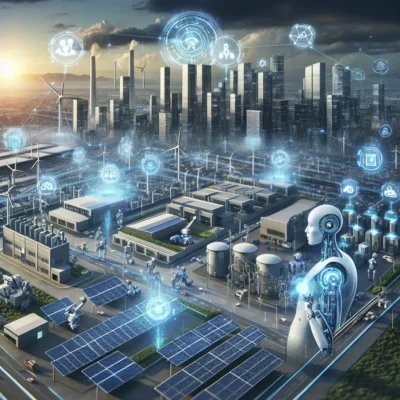The Intersection of AI and Energy
As global industries continue to expand, the demand for energy efficiency has never been more critical. The relentless pursuit of sustainability is driving industries to rethink their operations, focusing on reducing carbon footprints and optimizing energy use. Artificial Intelligence (AI) is at the forefront of this transformation, integrating seamlessly into energy management systems to revolutionize how industries consume and conserve energy.
AI technologies are being embedded in energy systems to enhance efficiency and sustainability. These technologies not only help in monitoring energy consumption but also in predicting future patterns, allowing industries to optimize their energy use. The importance of sustainability in industrial operations cannot be overstated, as it not only reduces environmental impact but also cuts costs and improves operational efficiency.
AI-Driven Energy Management Systems
AI algorithms are pivotal in predicting energy consumption patterns. By analyzing historical data and real-time inputs, AI can forecast energy needs with remarkable accuracy. This predictive capability allows industries to plan and allocate resources more efficiently, minimizing energy waste and optimizing consumption.
Moreover, AI can automate energy distribution, ensuring that energy is used where and when it is needed most. This automation reduces waste, as energy is not unnecessarily distributed to areas with low demand. Several industries have successfully implemented AI-driven energy management systems, showcasing significant reductions in energy consumption and operational costs. For instance, manufacturing plants have reported up to a 20% reduction in energy use after integrating AI technologies.
Enhancing Renewable Energy Integration
Renewable energy sources like solar and wind are inherently variable, posing challenges to consistent energy supply. AI plays a crucial role in optimizing the use of these renewable sources. By analyzing weather patterns and energy demand, AI can efficiently balance energy grids, ensuring a stable supply even with fluctuating inputs.
AI techniques such as machine learning and neural networks are employed to predict and manage these variabilities. For example, AI systems can adjust the tilt of solar panels based on predicted sunlight exposure or regulate wind turbine operations to maximize energy capture. These innovations have significantly improved the efficiency of renewable energy systems, making them more reliable and cost-effective.
Predictive Maintenance and Energy Efficiency
One of the standout applications of AI in energy efficiency is predictive maintenance. AI systems can predict equipment failures before they occur, preventing energy loss and reducing downtime. By analyzing data from sensors and historical maintenance records, AI can identify patterns that precede equipment failure, allowing for timely interventions.
The impact of AI-driven maintenance on energy consumption is profound. Industries have reported up to a 30% reduction in maintenance costs and a 20% increase in equipment lifespan. Real-world applications span various sectors, from manufacturing to transportation, where AI ensures that machinery operates at peak efficiency, minimizing energy waste.
AI in Smart Grids and Energy Storage
Smart grids are the backbone of modern energy distribution, and AI is instrumental in their development and management. AI enhances smart grids by optimizing energy flow, predicting demand, and balancing load distribution. This results in more efficient and reliable energy delivery, reducing the strain on energy resources.
Innovations in AI are also optimizing energy storage solutions. AI algorithms can determine the best times to store and release energy, maximizing the use of renewable sources and reducing reliance on non-renewable energy. AI-enhanced smart grids offer numerous benefits, including reduced energy costs, improved grid reliability, and increased integration of renewable energy sources.
Future Prospects and Challenges
The future of AI in energy efficiency is promising, with potential advancements poised to further optimize energy use. AI could enable even more precise energy predictions, improved automation, and enhanced integration of renewable sources. However, industries face challenges in adopting these technologies, including high initial costs, the need for skilled personnel, and data privacy concerns.
Policy and regulation play a crucial role in facilitating AI-driven energy sustainability initiatives. Governments and regulatory bodies must create frameworks that encourage innovation while ensuring ethical use of AI technologies. As industries continue to embrace AI, collaboration between stakeholders will be essential to overcome these challenges and harness the full potential of AI in powering sustainability.
The integration of AI in energy systems is not just a technological advancement; it is a necessary step towards a sustainable future. By optimizing energy use and reducing waste, AI is helping industries meet their sustainability goals while paving the way for a cleaner, more efficient world.
